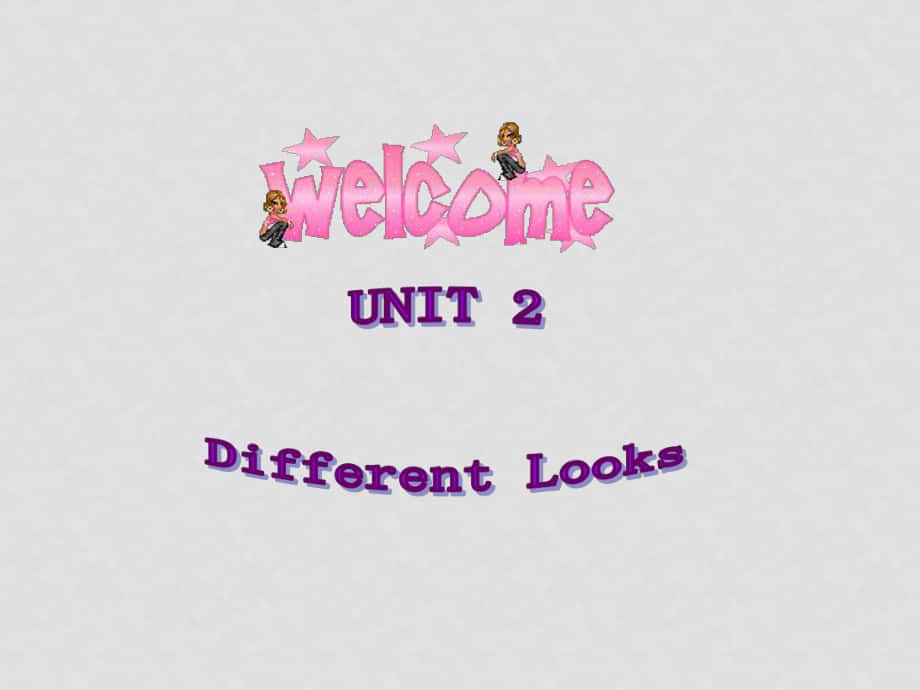《七年級(jí)英語(yǔ)上:Unit 2 Topic 2 What does she look like課件(仁愛(ài)版)topic2 sectionA》由會(huì)員分享��,可在線閱讀�����,更多相關(guān)《七年級(jí)英語(yǔ)上:Unit 2 Topic 2 What does she look like課件(仁愛(ài)版)topic2 sectionA(20頁(yè)珍藏版)》請(qǐng)?jiān)谘b配圖網(wǎng)上搜索�����。
1��、look the samebothblackblondbluebrownVocabulary看起來(lái)一樣看起來(lái)一樣pron. 兩者����,雙方兩者,雙方adj. &n. 黑色(的)黑色(的)adj. 金黃色的金黃色的, 淺黃的淺黃的adj. &n. 藍(lán)色(的)藍(lán)色(的)adj. &n. 棕色(的)棕色(的)adj. &n. 粉紅色(的)粉紅色(的) likelook like willyoungsnowmanhereDo you still remember how to describe people?Review:I have a small nose.He has a wide mouth.We
2��、 both have big heads. How to describe them?They have wide mouths, black skins and black hair. She has blond hair, blue and big eyes and white skin(膚色膚色).She has black hair, black eyes and yellow skin and a small face.1A. LISTEN, READ AND SAY Who is that boy?Oh, he is my friend, Yukio.(M=Michael; K=K
3、angkang)M: Hello, Kangkang! Who is that boy?K: Oh, he is my friend, Yukio. M: Where is he from?K:He is from Japan.M: But you look the same.K: Thats right. We both have black hair and black eyes.M: I have blond hair and blue eyes.K: We have different looks, but we are good friends. Read again and ans
4�����、wer the questions.1.Who are talking in the conversation(對(duì)話對(duì)話)?2.Who is Yukio?3. What does Michael look like?Michael and Kangkang.Yukio is Kangkangs good friend.Michael has blond hair and blue eyes. 1. Whos that boy?那個(gè)男孩是誰(shuí)����?那個(gè)男孩是誰(shuí)? 這是由這是由Who引導(dǎo)的特殊疑問(wèn)句�,詢問(wèn)某引導(dǎo)的特殊疑問(wèn)句,詢問(wèn)某 人的身份����。人的身份。 如:如: Whos that girl over
5����、there?2. Where is he from? 他來(lái)自哪里?他來(lái)自哪里�����? 此句是此句是where引導(dǎo)的特殊疑問(wèn)句��,旨在詢引導(dǎo)的特殊疑問(wèn)句�,旨在詢 問(wèn)別人的家鄉(xiāng)在哪里或?qū)Ψ降某錾亍?wèn)別人的家鄉(xiāng)在哪里或?qū)Ψ降某錾亍?詢問(wèn)詢問(wèn)“(某人)是哪里人(某人)是哪里人”�����,常用�����,常用 Where from? 結(jié)構(gòu)�����。結(jié)構(gòu)��。be from相當(dāng)于相當(dāng)于 come from ���,因此上句可改為:���,因此上句可改為: Where does he come from?3. Thats right. 是的,你說(shuō)的對(duì)���。是的�,你說(shuō)的對(duì)����。 Thats right 是對(duì)某一觀點(diǎn)���、判斷或回答是對(duì)某一觀點(diǎn)、判斷或回答 作評(píng)判的用語(yǔ)��,或?qū)?duì)方的說(shuō)法表示贊作評(píng)判的用語(yǔ)���,或?qū)?duì)方的說(shuō)法表示贊 同��,常用同����,常用Thats right, 表示表示“是的���,對(duì)是的�����,對(duì) 了��,你說(shuō)的對(duì)了,你說(shuō)的對(duì)”等意思����。有時(shí)也可以用等意思��。有時(shí)也可以用 Youre right 或或Right, OK來(lái)代替����。如:來(lái)代替��。如: Are you in Class One? 你在一班嗎�����?你在一班嗎����? Thats right. 是的是的/ 沒(méi)錯(cuò)。沒(méi)錯(cuò)���。
 七年級(jí)英語(yǔ)上:Unit 2 Topic 2 What does she look like課件(仁愛(ài)版)topic2 sectionA
七年級(jí)英語(yǔ)上:Unit 2 Topic 2 What does she look like課件(仁愛(ài)版)topic2 sectionA

